A Comprehensive Report: Legislation, Ethics, and CSR in Tourism
VerifiedAdded on 2021/01/03
|17
|6353
|495
Report
AI Summary
This report provides a comprehensive overview of legislation and ethics within the travel and tourism sector, using Thomas Cook as a case study. It examines the legal and regulatory frameworks in England and Wales, including transport laws related to surface, sea, and air travel. The report explores the impact of health, safety, and security legislation, as well as equality laws. It delves into contract and consumer protection legislation, highlighting ethical dilemmas and the Corporate Social Responsibility (CSR) policy of Thomas Cook. The analysis covers various legal obligations, including those related to passenger carriage and the responsibilities of travel operators. Furthermore, it considers international conventions and regulations impacting safety and passenger rights across different modes of transport. The report aims to provide a thorough understanding of the legal and ethical challenges faced by the travel and tourism industry.
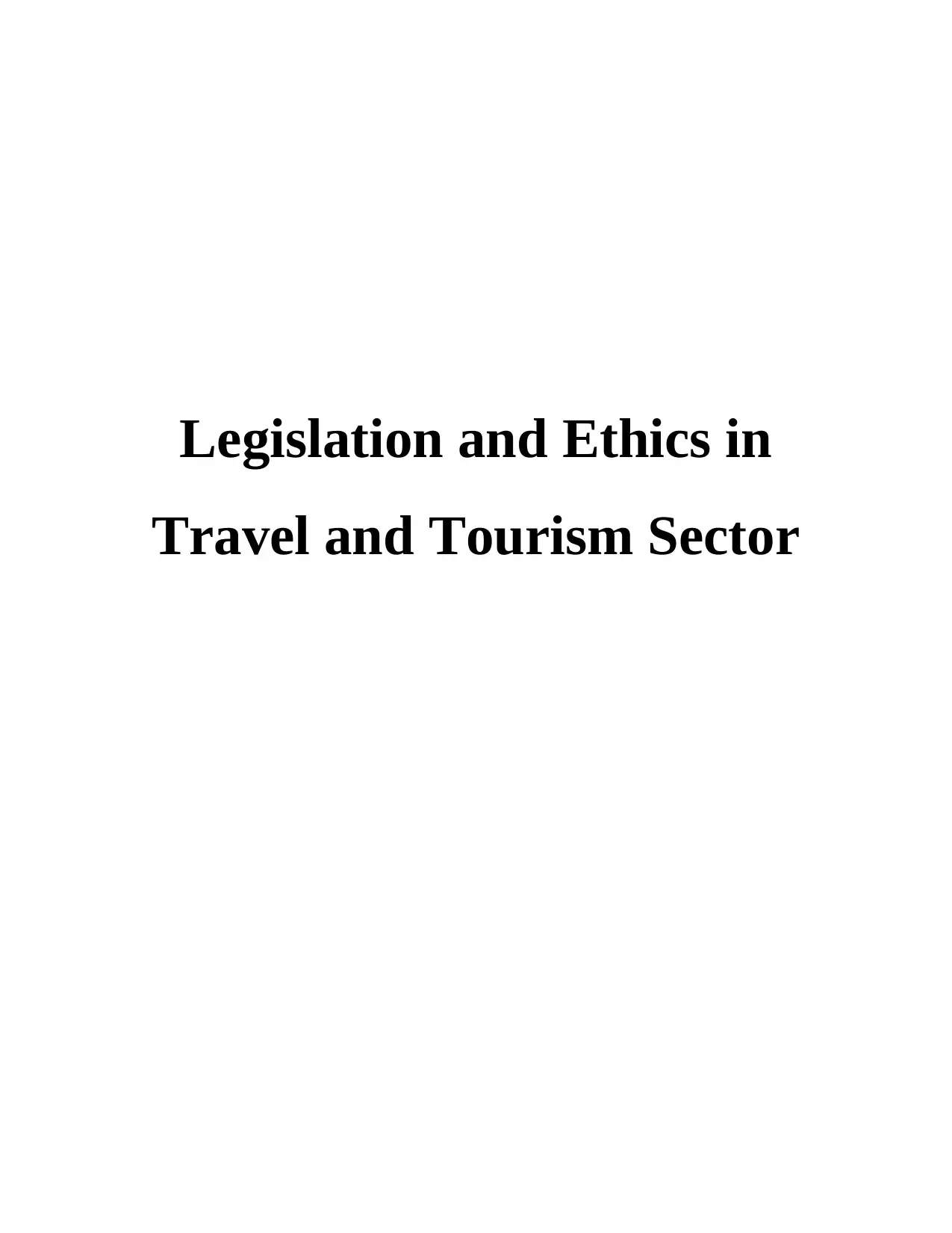
Legislation and Ethics in
Travel and Tourism Sector
Travel and Tourism Sector
Paraphrase This Document
Need a fresh take? Get an instant paraphrase of this document with our AI Paraphraser
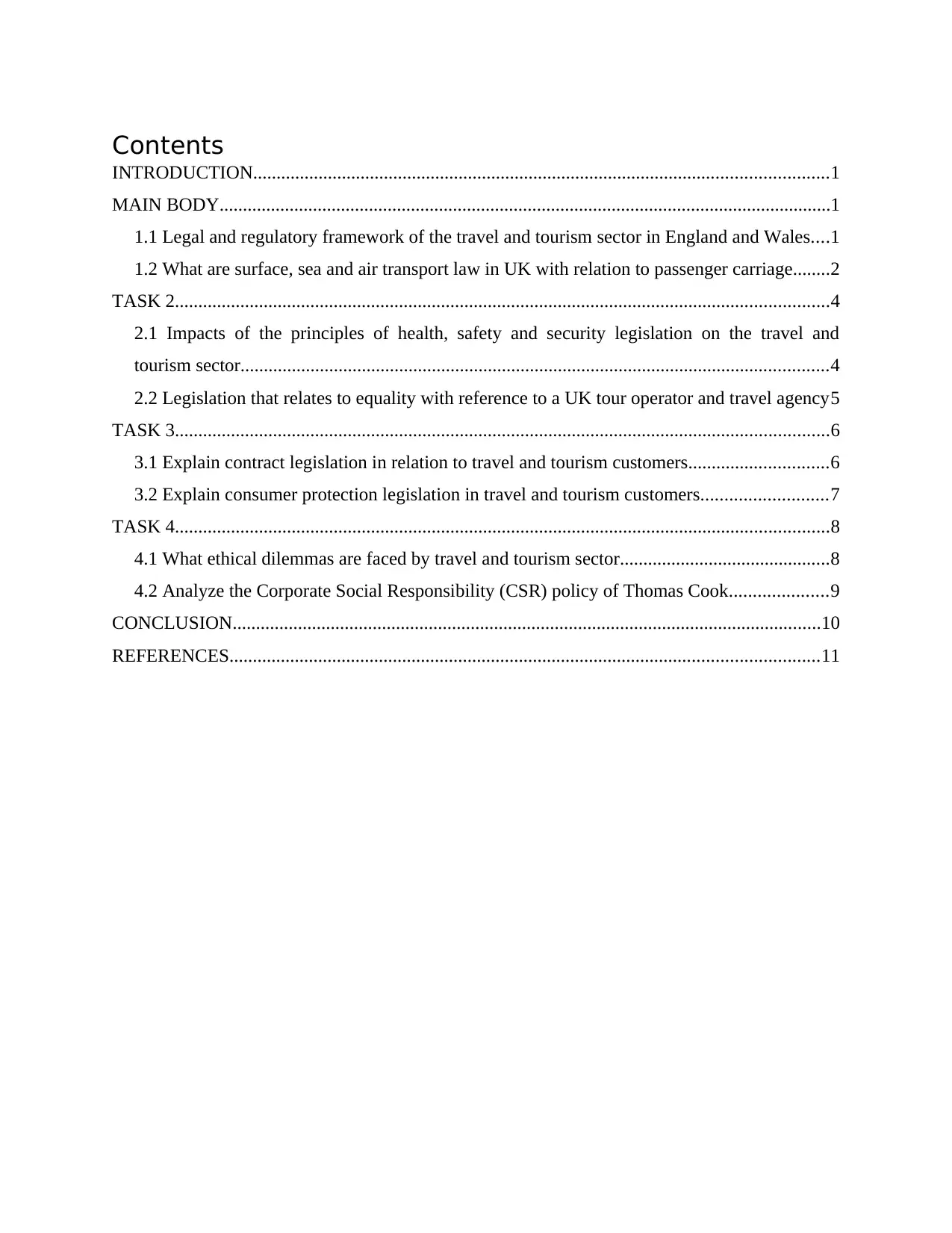
Contents
INTRODUCTION...........................................................................................................................1
MAIN BODY...................................................................................................................................1
1.1 Legal and regulatory framework of the travel and tourism sector in England and Wales....1
1.2 What are surface, sea and air transport law in UK with relation to passenger carriage........2
TASK 2............................................................................................................................................4
2.1 Impacts of the principles of health, safety and security legislation on the travel and
tourism sector..............................................................................................................................4
2.2 Legislation that relates to equality with reference to a UK tour operator and travel agency5
TASK 3............................................................................................................................................6
3.1 Explain contract legislation in relation to travel and tourism customers..............................6
3.2 Explain consumer protection legislation in travel and tourism customers...........................7
TASK 4............................................................................................................................................8
4.1 What ethical dilemmas are faced by travel and tourism sector.............................................8
4.2 Analyze the Corporate Social Responsibility (CSR) policy of Thomas Cook.....................9
CONCLUSION..............................................................................................................................10
REFERENCES..............................................................................................................................11
INTRODUCTION...........................................................................................................................1
MAIN BODY...................................................................................................................................1
1.1 Legal and regulatory framework of the travel and tourism sector in England and Wales....1
1.2 What are surface, sea and air transport law in UK with relation to passenger carriage........2
TASK 2............................................................................................................................................4
2.1 Impacts of the principles of health, safety and security legislation on the travel and
tourism sector..............................................................................................................................4
2.2 Legislation that relates to equality with reference to a UK tour operator and travel agency5
TASK 3............................................................................................................................................6
3.1 Explain contract legislation in relation to travel and tourism customers..............................6
3.2 Explain consumer protection legislation in travel and tourism customers...........................7
TASK 4............................................................................................................................................8
4.1 What ethical dilemmas are faced by travel and tourism sector.............................................8
4.2 Analyze the Corporate Social Responsibility (CSR) policy of Thomas Cook.....................9
CONCLUSION..............................................................................................................................10
REFERENCES..............................................................................................................................11
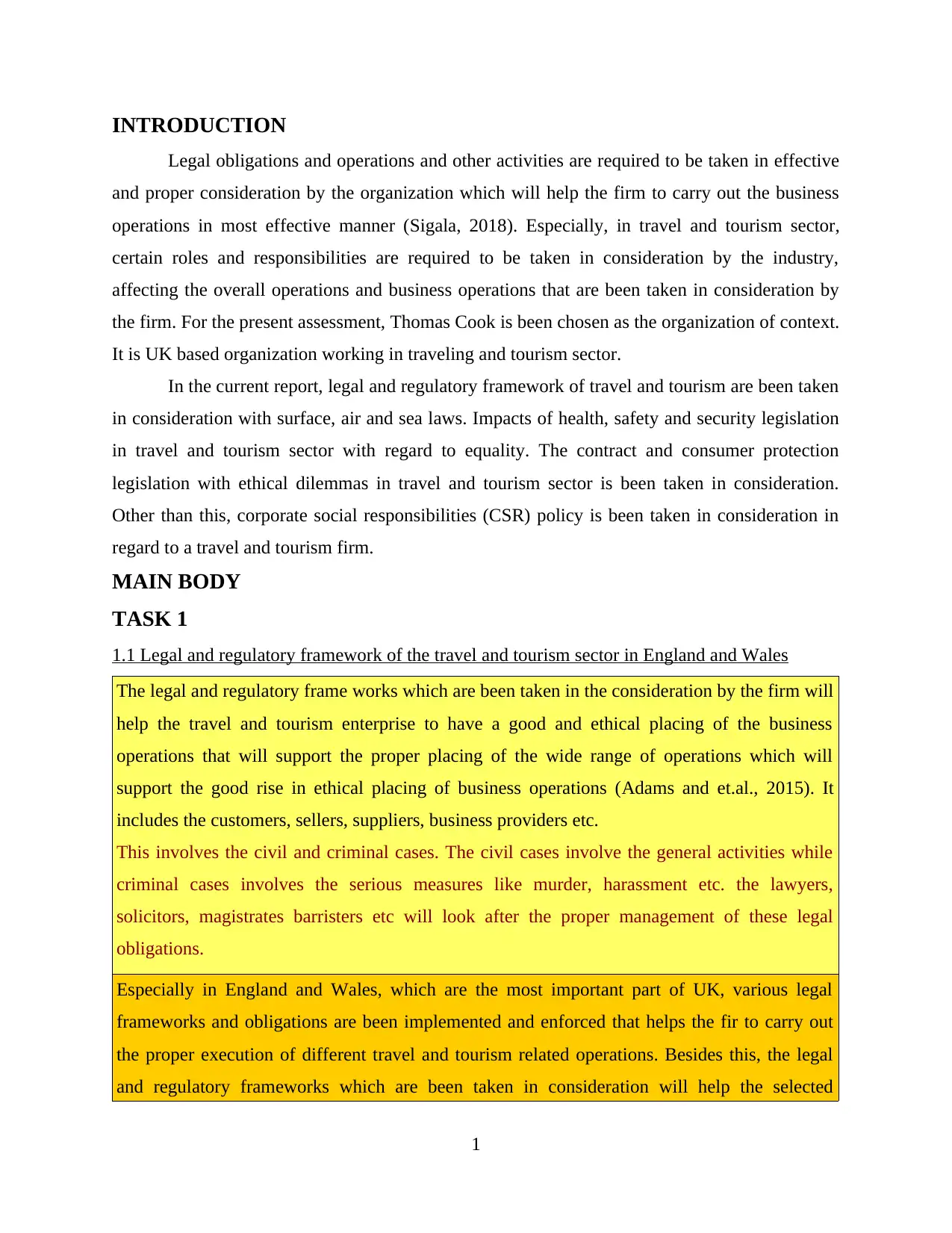
INTRODUCTION
Legal obligations and operations and other activities are required to be taken in effective
and proper consideration by the organization which will help the firm to carry out the business
operations in most effective manner (Sigala, 2018). Especially, in travel and tourism sector,
certain roles and responsibilities are required to be taken in consideration by the industry,
affecting the overall operations and business operations that are been taken in consideration by
the firm. For the present assessment, Thomas Cook is been chosen as the organization of context.
It is UK based organization working in traveling and tourism sector.
In the current report, legal and regulatory framework of travel and tourism are been taken
in consideration with surface, air and sea laws. Impacts of health, safety and security legislation
in travel and tourism sector with regard to equality. The contract and consumer protection
legislation with ethical dilemmas in travel and tourism sector is been taken in consideration.
Other than this, corporate social responsibilities (CSR) policy is been taken in consideration in
regard to a travel and tourism firm.
MAIN BODY
TASK 1
1.1 Legal and regulatory framework of the travel and tourism sector in England and Wales
The legal and regulatory frame works which are been taken in the consideration by the firm will
help the travel and tourism enterprise to have a good and ethical placing of the business
operations that will support the proper placing of the wide range of operations which will
support the good rise in ethical placing of business operations (Adams and et.al., 2015). It
includes the customers, sellers, suppliers, business providers etc.
This involves the civil and criminal cases. The civil cases involve the general activities while
criminal cases involves the serious measures like murder, harassment etc. the lawyers,
solicitors, magistrates barristers etc will look after the proper management of these legal
obligations.
Especially in England and Wales, which are the most important part of UK, various legal
frameworks and obligations are been implemented and enforced that helps the fir to carry out
the proper execution of different travel and tourism related operations. Besides this, the legal
and regulatory frameworks which are been taken in consideration will help the selected
1
Legal obligations and operations and other activities are required to be taken in effective
and proper consideration by the organization which will help the firm to carry out the business
operations in most effective manner (Sigala, 2018). Especially, in travel and tourism sector,
certain roles and responsibilities are required to be taken in consideration by the industry,
affecting the overall operations and business operations that are been taken in consideration by
the firm. For the present assessment, Thomas Cook is been chosen as the organization of context.
It is UK based organization working in traveling and tourism sector.
In the current report, legal and regulatory framework of travel and tourism are been taken
in consideration with surface, air and sea laws. Impacts of health, safety and security legislation
in travel and tourism sector with regard to equality. The contract and consumer protection
legislation with ethical dilemmas in travel and tourism sector is been taken in consideration.
Other than this, corporate social responsibilities (CSR) policy is been taken in consideration in
regard to a travel and tourism firm.
MAIN BODY
TASK 1
1.1 Legal and regulatory framework of the travel and tourism sector in England and Wales
The legal and regulatory frame works which are been taken in the consideration by the firm will
help the travel and tourism enterprise to have a good and ethical placing of the business
operations that will support the proper placing of the wide range of operations which will
support the good rise in ethical placing of business operations (Adams and et.al., 2015). It
includes the customers, sellers, suppliers, business providers etc.
This involves the civil and criminal cases. The civil cases involve the general activities while
criminal cases involves the serious measures like murder, harassment etc. the lawyers,
solicitors, magistrates barristers etc will look after the proper management of these legal
obligations.
Especially in England and Wales, which are the most important part of UK, various legal
frameworks and obligations are been implemented and enforced that helps the fir to carry out
the proper execution of different travel and tourism related operations. Besides this, the legal
and regulatory frameworks which are been taken in consideration will help the selected
1
⊘ This is a preview!⊘
Do you want full access?
Subscribe today to unlock all pages.

Trusted by 1+ million students worldwide
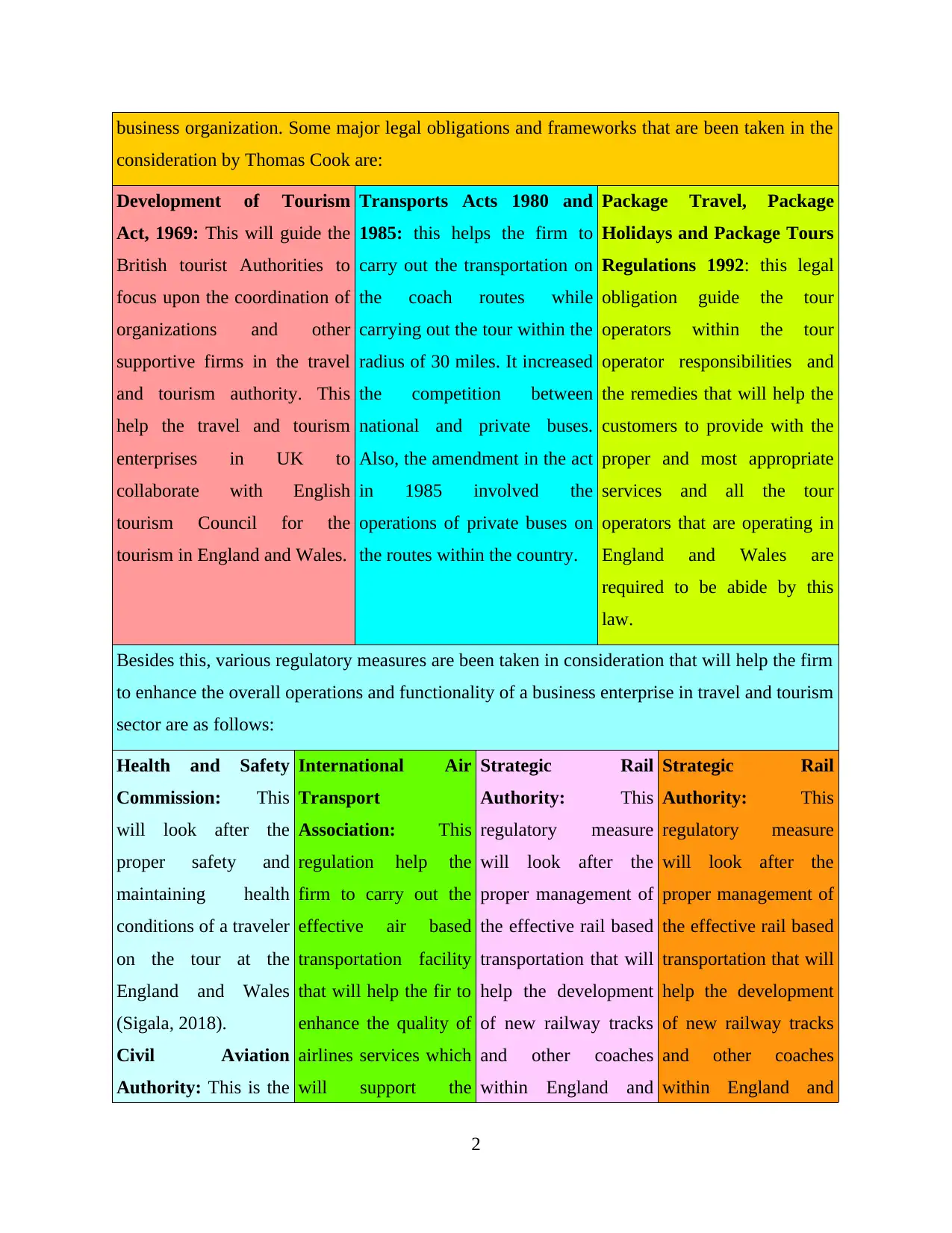
business organization. Some major legal obligations and frameworks that are been taken in the
consideration by Thomas Cook are:
Development of Tourism
Act, 1969: This will guide the
British tourist Authorities to
focus upon the coordination of
organizations and other
supportive firms in the travel
and tourism authority. This
help the travel and tourism
enterprises in UK to
collaborate with English
tourism Council for the
tourism in England and Wales.
Transports Acts 1980 and
1985: this helps the firm to
carry out the transportation on
the coach routes while
carrying out the tour within the
radius of 30 miles. It increased
the competition between
national and private buses.
Also, the amendment in the act
in 1985 involved the
operations of private buses on
the routes within the country.
Package Travel, Package
Holidays and Package Tours
Regulations 1992: this legal
obligation guide the tour
operators within the tour
operator responsibilities and
the remedies that will help the
customers to provide with the
proper and most appropriate
services and all the tour
operators that are operating in
England and Wales are
required to be abide by this
law.
Besides this, various regulatory measures are been taken in consideration that will help the firm
to enhance the overall operations and functionality of a business enterprise in travel and tourism
sector are as follows:
Health and Safety
Commission: This
will look after the
proper safety and
maintaining health
conditions of a traveler
on the tour at the
England and Wales
(Sigala, 2018).
Civil Aviation
Authority: This is the
International Air
Transport
Association: This
regulation help the
firm to carry out the
effective air based
transportation facility
that will help the fir to
enhance the quality of
airlines services which
will support the
Strategic Rail
Authority: This
regulatory measure
will look after the
proper management of
the effective rail based
transportation that will
help the development
of new railway tracks
and other coaches
within England and
Strategic Rail
Authority: This
regulatory measure
will look after the
proper management of
the effective rail based
transportation that will
help the development
of new railway tracks
and other coaches
within England and
2
consideration by Thomas Cook are:
Development of Tourism
Act, 1969: This will guide the
British tourist Authorities to
focus upon the coordination of
organizations and other
supportive firms in the travel
and tourism authority. This
help the travel and tourism
enterprises in UK to
collaborate with English
tourism Council for the
tourism in England and Wales.
Transports Acts 1980 and
1985: this helps the firm to
carry out the transportation on
the coach routes while
carrying out the tour within the
radius of 30 miles. It increased
the competition between
national and private buses.
Also, the amendment in the act
in 1985 involved the
operations of private buses on
the routes within the country.
Package Travel, Package
Holidays and Package Tours
Regulations 1992: this legal
obligation guide the tour
operators within the tour
operator responsibilities and
the remedies that will help the
customers to provide with the
proper and most appropriate
services and all the tour
operators that are operating in
England and Wales are
required to be abide by this
law.
Besides this, various regulatory measures are been taken in consideration that will help the firm
to enhance the overall operations and functionality of a business enterprise in travel and tourism
sector are as follows:
Health and Safety
Commission: This
will look after the
proper safety and
maintaining health
conditions of a traveler
on the tour at the
England and Wales
(Sigala, 2018).
Civil Aviation
Authority: This is the
International Air
Transport
Association: This
regulation help the
firm to carry out the
effective air based
transportation facility
that will help the fir to
enhance the quality of
airlines services which
will support the
Strategic Rail
Authority: This
regulatory measure
will look after the
proper management of
the effective rail based
transportation that will
help the development
of new railway tracks
and other coaches
within England and
Strategic Rail
Authority: This
regulatory measure
will look after the
proper management of
the effective rail based
transportation that will
help the development
of new railway tracks
and other coaches
within England and
2
Paraphrase This Document
Need a fresh take? Get an instant paraphrase of this document with our AI Paraphraser
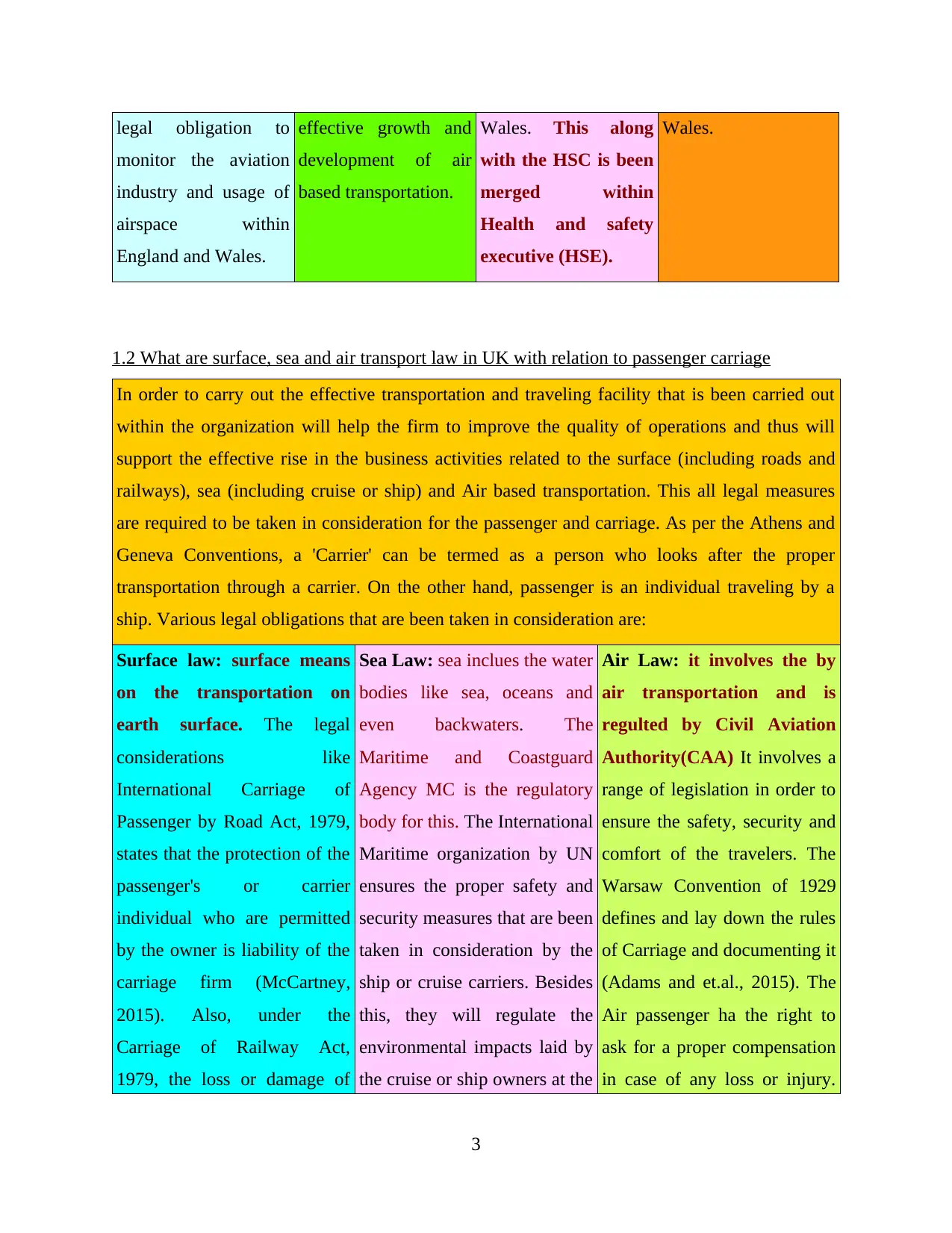
legal obligation to
monitor the aviation
industry and usage of
airspace within
England and Wales.
effective growth and
development of air
based transportation.
Wales. This along
with the HSC is been
merged within
Health and safety
executive (HSE).
Wales.
1.2 What are surface, sea and air transport law in UK with relation to passenger carriage
In order to carry out the effective transportation and traveling facility that is been carried out
within the organization will help the firm to improve the quality of operations and thus will
support the effective rise in the business activities related to the surface (including roads and
railways), sea (including cruise or ship) and Air based transportation. This all legal measures
are required to be taken in consideration for the passenger and carriage. As per the Athens and
Geneva Conventions, a 'Carrier' can be termed as a person who looks after the proper
transportation through a carrier. On the other hand, passenger is an individual traveling by a
ship. Various legal obligations that are been taken in consideration are:
Surface law: surface means
on the transportation on
earth surface. The legal
considerations like
International Carriage of
Passenger by Road Act, 1979,
states that the protection of the
passenger's or carrier
individual who are permitted
by the owner is liability of the
carriage firm (McCartney,
2015). Also, under the
Carriage of Railway Act,
1979, the loss or damage of
Sea Law: sea inclues the water
bodies like sea, oceans and
even backwaters. The
Maritime and Coastguard
Agency MC is the regulatory
body for this. The International
Maritime organization by UN
ensures the proper safety and
security measures that are been
taken in consideration by the
ship or cruise carriers. Besides
this, they will regulate the
environmental impacts laid by
the cruise or ship owners at the
Air Law: it involves the by
air transportation and is
regulted by Civil Aviation
Authority(CAA) It involves a
range of legislation in order to
ensure the safety, security and
comfort of the travelers. The
Warsaw Convention of 1929
defines and lay down the rules
of Carriage and documenting it
(Adams and et.al., 2015). The
Air passenger ha the right to
ask for a proper compensation
in case of any loss or injury.
3
monitor the aviation
industry and usage of
airspace within
England and Wales.
effective growth and
development of air
based transportation.
Wales. This along
with the HSC is been
merged within
Health and safety
executive (HSE).
Wales.
1.2 What are surface, sea and air transport law in UK with relation to passenger carriage
In order to carry out the effective transportation and traveling facility that is been carried out
within the organization will help the firm to improve the quality of operations and thus will
support the effective rise in the business activities related to the surface (including roads and
railways), sea (including cruise or ship) and Air based transportation. This all legal measures
are required to be taken in consideration for the passenger and carriage. As per the Athens and
Geneva Conventions, a 'Carrier' can be termed as a person who looks after the proper
transportation through a carrier. On the other hand, passenger is an individual traveling by a
ship. Various legal obligations that are been taken in consideration are:
Surface law: surface means
on the transportation on
earth surface. The legal
considerations like
International Carriage of
Passenger by Road Act, 1979,
states that the protection of the
passenger's or carrier
individual who are permitted
by the owner is liability of the
carriage firm (McCartney,
2015). Also, under the
Carriage of Railway Act,
1979, the loss or damage of
Sea Law: sea inclues the water
bodies like sea, oceans and
even backwaters. The
Maritime and Coastguard
Agency MC is the regulatory
body for this. The International
Maritime organization by UN
ensures the proper safety and
security measures that are been
taken in consideration by the
ship or cruise carriers. Besides
this, they will regulate the
environmental impacts laid by
the cruise or ship owners at the
Air Law: it involves the by
air transportation and is
regulted by Civil Aviation
Authority(CAA) It involves a
range of legislation in order to
ensure the safety, security and
comfort of the travelers. The
Warsaw Convention of 1929
defines and lay down the rules
of Carriage and documenting it
(Adams and et.al., 2015). The
Air passenger ha the right to
ask for a proper compensation
in case of any loss or injury.
3
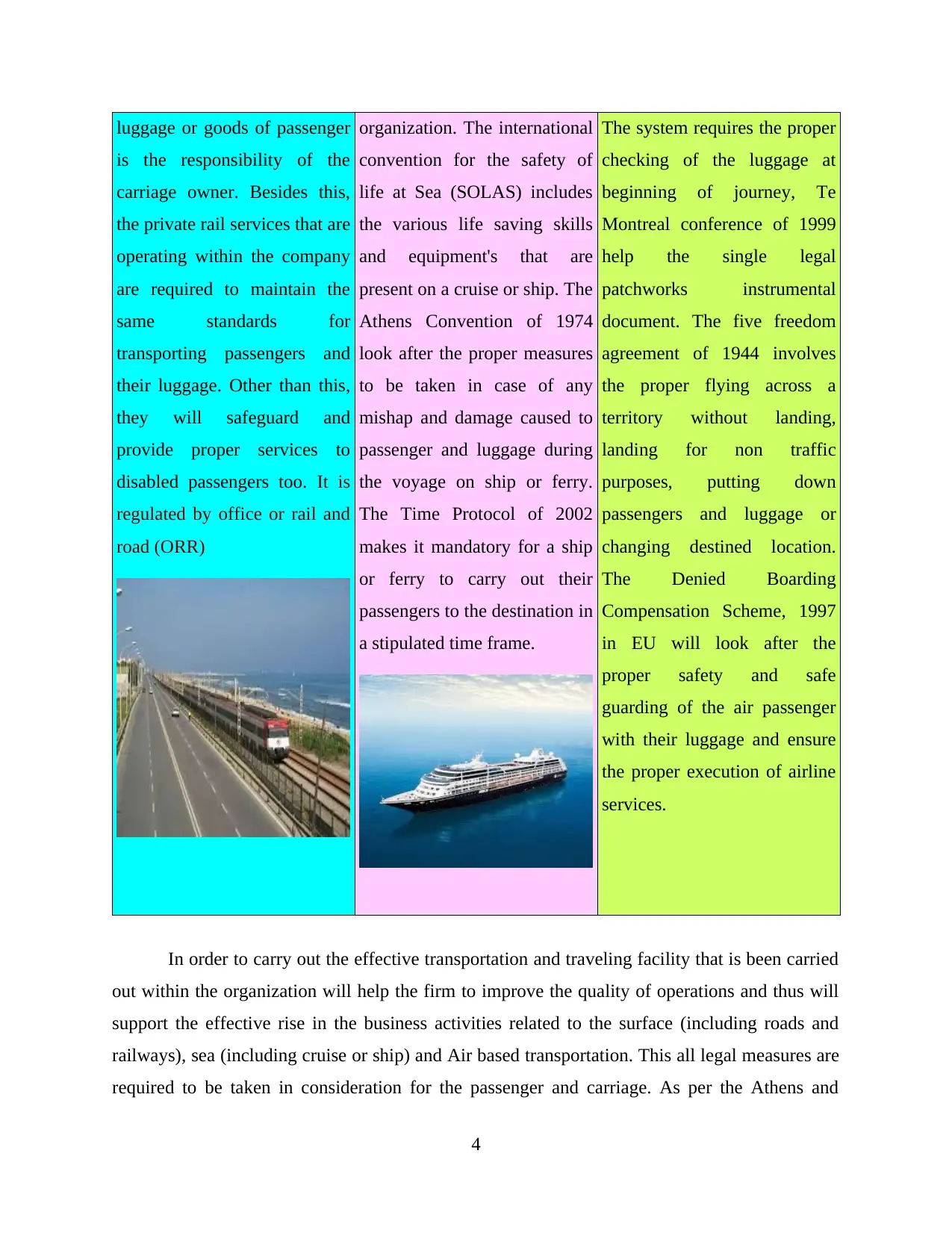
luggage or goods of passenger
is the responsibility of the
carriage owner. Besides this,
the private rail services that are
operating within the company
are required to maintain the
same standards for
transporting passengers and
their luggage. Other than this,
they will safeguard and
provide proper services to
disabled passengers too. It is
regulated by office or rail and
road (ORR)
organization. The international
convention for the safety of
life at Sea (SOLAS) includes
the various life saving skills
and equipment's that are
present on a cruise or ship. The
Athens Convention of 1974
look after the proper measures
to be taken in case of any
mishap and damage caused to
passenger and luggage during
the voyage on ship or ferry.
The Time Protocol of 2002
makes it mandatory for a ship
or ferry to carry out their
passengers to the destination in
a stipulated time frame.
The system requires the proper
checking of the luggage at
beginning of journey, Te
Montreal conference of 1999
help the single legal
patchworks instrumental
document. The five freedom
agreement of 1944 involves
the proper flying across a
territory without landing,
landing for non traffic
purposes, putting down
passengers and luggage or
changing destined location.
The Denied Boarding
Compensation Scheme, 1997
in EU will look after the
proper safety and safe
guarding of the air passenger
with their luggage and ensure
the proper execution of airline
services.
In order to carry out the effective transportation and traveling facility that is been carried
out within the organization will help the firm to improve the quality of operations and thus will
support the effective rise in the business activities related to the surface (including roads and
railways), sea (including cruise or ship) and Air based transportation. This all legal measures are
required to be taken in consideration for the passenger and carriage. As per the Athens and
4
is the responsibility of the
carriage owner. Besides this,
the private rail services that are
operating within the company
are required to maintain the
same standards for
transporting passengers and
their luggage. Other than this,
they will safeguard and
provide proper services to
disabled passengers too. It is
regulated by office or rail and
road (ORR)
organization. The international
convention for the safety of
life at Sea (SOLAS) includes
the various life saving skills
and equipment's that are
present on a cruise or ship. The
Athens Convention of 1974
look after the proper measures
to be taken in case of any
mishap and damage caused to
passenger and luggage during
the voyage on ship or ferry.
The Time Protocol of 2002
makes it mandatory for a ship
or ferry to carry out their
passengers to the destination in
a stipulated time frame.
The system requires the proper
checking of the luggage at
beginning of journey, Te
Montreal conference of 1999
help the single legal
patchworks instrumental
document. The five freedom
agreement of 1944 involves
the proper flying across a
territory without landing,
landing for non traffic
purposes, putting down
passengers and luggage or
changing destined location.
The Denied Boarding
Compensation Scheme, 1997
in EU will look after the
proper safety and safe
guarding of the air passenger
with their luggage and ensure
the proper execution of airline
services.
In order to carry out the effective transportation and traveling facility that is been carried
out within the organization will help the firm to improve the quality of operations and thus will
support the effective rise in the business activities related to the surface (including roads and
railways), sea (including cruise or ship) and Air based transportation. This all legal measures are
required to be taken in consideration for the passenger and carriage. As per the Athens and
4
⊘ This is a preview!⊘
Do you want full access?
Subscribe today to unlock all pages.

Trusted by 1+ million students worldwide
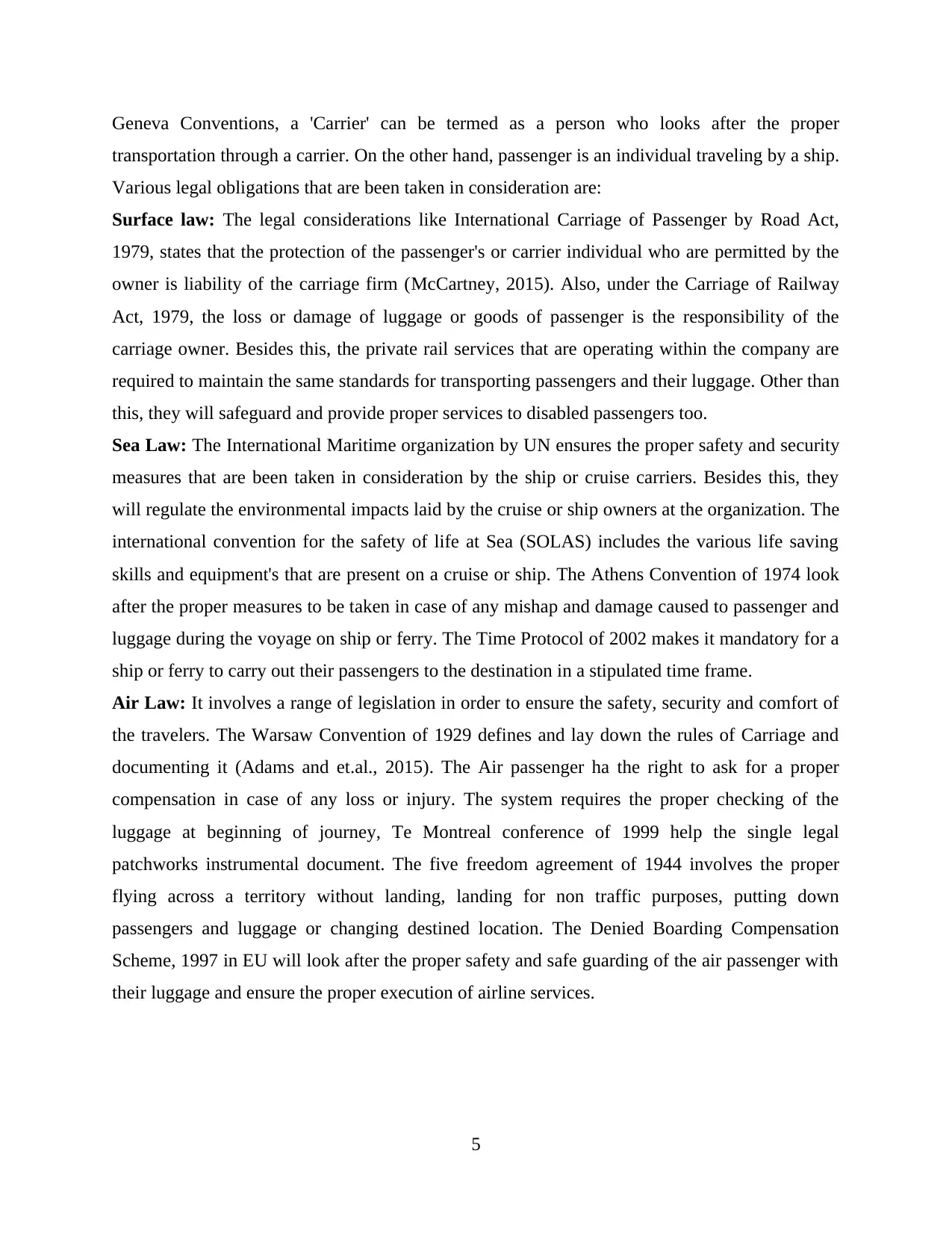
Geneva Conventions, a 'Carrier' can be termed as a person who looks after the proper
transportation through a carrier. On the other hand, passenger is an individual traveling by a ship.
Various legal obligations that are been taken in consideration are:
Surface law: The legal considerations like International Carriage of Passenger by Road Act,
1979, states that the protection of the passenger's or carrier individual who are permitted by the
owner is liability of the carriage firm (McCartney, 2015). Also, under the Carriage of Railway
Act, 1979, the loss or damage of luggage or goods of passenger is the responsibility of the
carriage owner. Besides this, the private rail services that are operating within the company are
required to maintain the same standards for transporting passengers and their luggage. Other than
this, they will safeguard and provide proper services to disabled passengers too.
Sea Law: The International Maritime organization by UN ensures the proper safety and security
measures that are been taken in consideration by the ship or cruise carriers. Besides this, they
will regulate the environmental impacts laid by the cruise or ship owners at the organization. The
international convention for the safety of life at Sea (SOLAS) includes the various life saving
skills and equipment's that are present on a cruise or ship. The Athens Convention of 1974 look
after the proper measures to be taken in case of any mishap and damage caused to passenger and
luggage during the voyage on ship or ferry. The Time Protocol of 2002 makes it mandatory for a
ship or ferry to carry out their passengers to the destination in a stipulated time frame.
Air Law: It involves a range of legislation in order to ensure the safety, security and comfort of
the travelers. The Warsaw Convention of 1929 defines and lay down the rules of Carriage and
documenting it (Adams and et.al., 2015). The Air passenger ha the right to ask for a proper
compensation in case of any loss or injury. The system requires the proper checking of the
luggage at beginning of journey, Te Montreal conference of 1999 help the single legal
patchworks instrumental document. The five freedom agreement of 1944 involves the proper
flying across a territory without landing, landing for non traffic purposes, putting down
passengers and luggage or changing destined location. The Denied Boarding Compensation
Scheme, 1997 in EU will look after the proper safety and safe guarding of the air passenger with
their luggage and ensure the proper execution of airline services.
5
transportation through a carrier. On the other hand, passenger is an individual traveling by a ship.
Various legal obligations that are been taken in consideration are:
Surface law: The legal considerations like International Carriage of Passenger by Road Act,
1979, states that the protection of the passenger's or carrier individual who are permitted by the
owner is liability of the carriage firm (McCartney, 2015). Also, under the Carriage of Railway
Act, 1979, the loss or damage of luggage or goods of passenger is the responsibility of the
carriage owner. Besides this, the private rail services that are operating within the company are
required to maintain the same standards for transporting passengers and their luggage. Other than
this, they will safeguard and provide proper services to disabled passengers too.
Sea Law: The International Maritime organization by UN ensures the proper safety and security
measures that are been taken in consideration by the ship or cruise carriers. Besides this, they
will regulate the environmental impacts laid by the cruise or ship owners at the organization. The
international convention for the safety of life at Sea (SOLAS) includes the various life saving
skills and equipment's that are present on a cruise or ship. The Athens Convention of 1974 look
after the proper measures to be taken in case of any mishap and damage caused to passenger and
luggage during the voyage on ship or ferry. The Time Protocol of 2002 makes it mandatory for a
ship or ferry to carry out their passengers to the destination in a stipulated time frame.
Air Law: It involves a range of legislation in order to ensure the safety, security and comfort of
the travelers. The Warsaw Convention of 1929 defines and lay down the rules of Carriage and
documenting it (Adams and et.al., 2015). The Air passenger ha the right to ask for a proper
compensation in case of any loss or injury. The system requires the proper checking of the
luggage at beginning of journey, Te Montreal conference of 1999 help the single legal
patchworks instrumental document. The five freedom agreement of 1944 involves the proper
flying across a territory without landing, landing for non traffic purposes, putting down
passengers and luggage or changing destined location. The Denied Boarding Compensation
Scheme, 1997 in EU will look after the proper safety and safe guarding of the air passenger with
their luggage and ensure the proper execution of airline services.
5
Paraphrase This Document
Need a fresh take? Get an instant paraphrase of this document with our AI Paraphraser
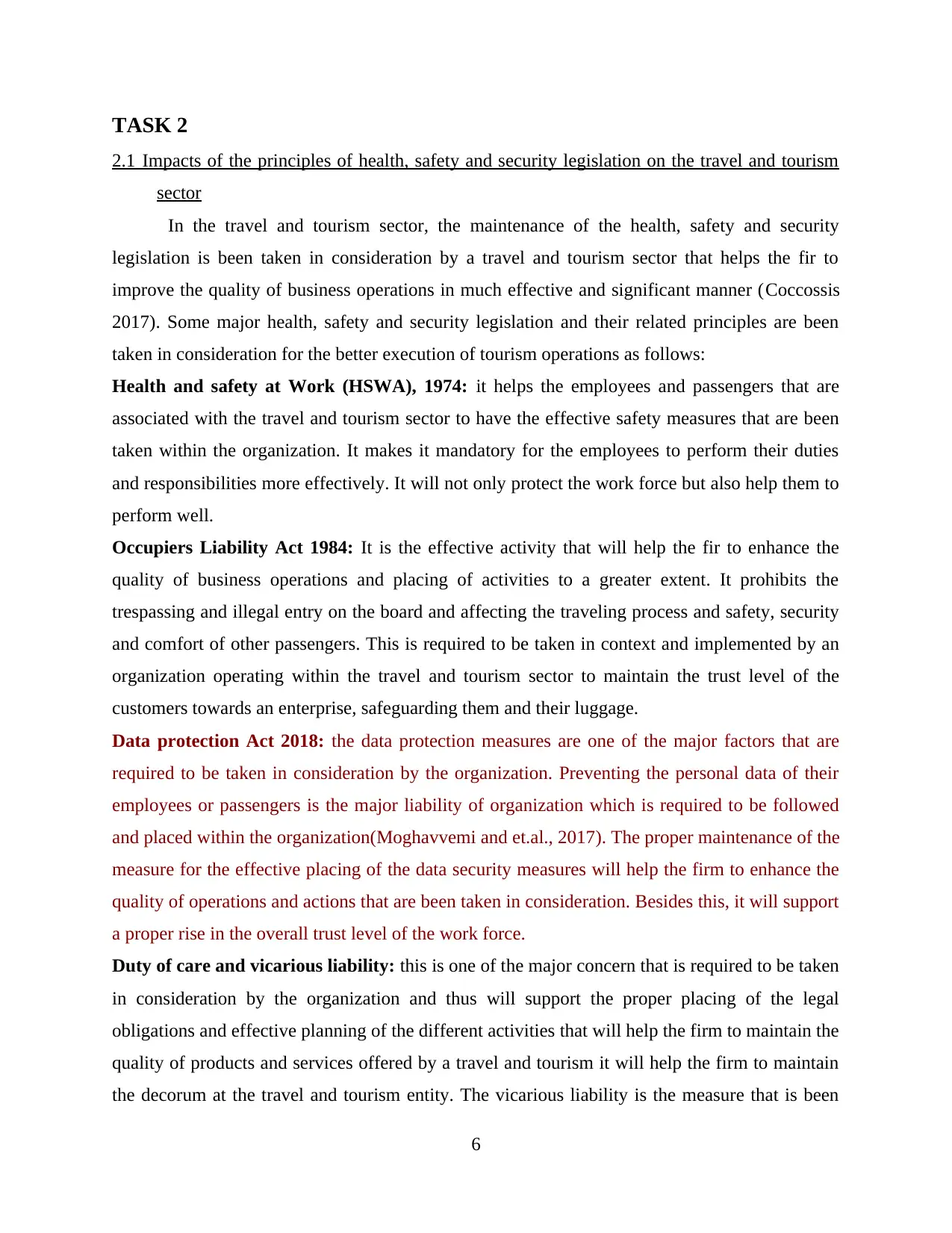
TASK 2
2.1 Impacts of the principles of health, safety and security legislation on the travel and tourism
sector
In the travel and tourism sector, the maintenance of the health, safety and security
legislation is been taken in consideration by a travel and tourism sector that helps the fir to
improve the quality of business operations in much effective and significant manner (Coccossis
2017). Some major health, safety and security legislation and their related principles are been
taken in consideration for the better execution of tourism operations as follows:
Health and safety at Work (HSWA), 1974: it helps the employees and passengers that are
associated with the travel and tourism sector to have the effective safety measures that are been
taken within the organization. It makes it mandatory for the employees to perform their duties
and responsibilities more effectively. It will not only protect the work force but also help them to
perform well.
Occupiers Liability Act 1984: It is the effective activity that will help the fir to enhance the
quality of business operations and placing of activities to a greater extent. It prohibits the
trespassing and illegal entry on the board and affecting the traveling process and safety, security
and comfort of other passengers. This is required to be taken in context and implemented by an
organization operating within the travel and tourism sector to maintain the trust level of the
customers towards an enterprise, safeguarding them and their luggage.
Data protection Act 2018: the data protection measures are one of the major factors that are
required to be taken in consideration by the organization. Preventing the personal data of their
employees or passengers is the major liability of organization which is required to be followed
and placed within the organization(Moghavvemi and et.al., 2017). The proper maintenance of the
measure for the effective placing of the data security measures will help the firm to enhance the
quality of operations and actions that are been taken in consideration. Besides this, it will support
a proper rise in the overall trust level of the work force.
Duty of care and vicarious liability: this is one of the major concern that is required to be taken
in consideration by the organization and thus will support the proper placing of the legal
obligations and effective planning of the different activities that will help the firm to maintain the
quality of products and services offered by a travel and tourism it will help the firm to maintain
the decorum at the travel and tourism entity. The vicarious liability is the measure that is been
6
2.1 Impacts of the principles of health, safety and security legislation on the travel and tourism
sector
In the travel and tourism sector, the maintenance of the health, safety and security
legislation is been taken in consideration by a travel and tourism sector that helps the fir to
improve the quality of business operations in much effective and significant manner (Coccossis
2017). Some major health, safety and security legislation and their related principles are been
taken in consideration for the better execution of tourism operations as follows:
Health and safety at Work (HSWA), 1974: it helps the employees and passengers that are
associated with the travel and tourism sector to have the effective safety measures that are been
taken within the organization. It makes it mandatory for the employees to perform their duties
and responsibilities more effectively. It will not only protect the work force but also help them to
perform well.
Occupiers Liability Act 1984: It is the effective activity that will help the fir to enhance the
quality of business operations and placing of activities to a greater extent. It prohibits the
trespassing and illegal entry on the board and affecting the traveling process and safety, security
and comfort of other passengers. This is required to be taken in context and implemented by an
organization operating within the travel and tourism sector to maintain the trust level of the
customers towards an enterprise, safeguarding them and their luggage.
Data protection Act 2018: the data protection measures are one of the major factors that are
required to be taken in consideration by the organization. Preventing the personal data of their
employees or passengers is the major liability of organization which is required to be followed
and placed within the organization(Moghavvemi and et.al., 2017). The proper maintenance of the
measure for the effective placing of the data security measures will help the firm to enhance the
quality of operations and actions that are been taken in consideration. Besides this, it will support
a proper rise in the overall trust level of the work force.
Duty of care and vicarious liability: this is one of the major concern that is required to be taken
in consideration by the organization and thus will support the proper placing of the legal
obligations and effective planning of the different activities that will help the firm to maintain the
quality of products and services offered by a travel and tourism it will help the firm to maintain
the decorum at the travel and tourism entity. The vicarious liability is the measure that is been
6
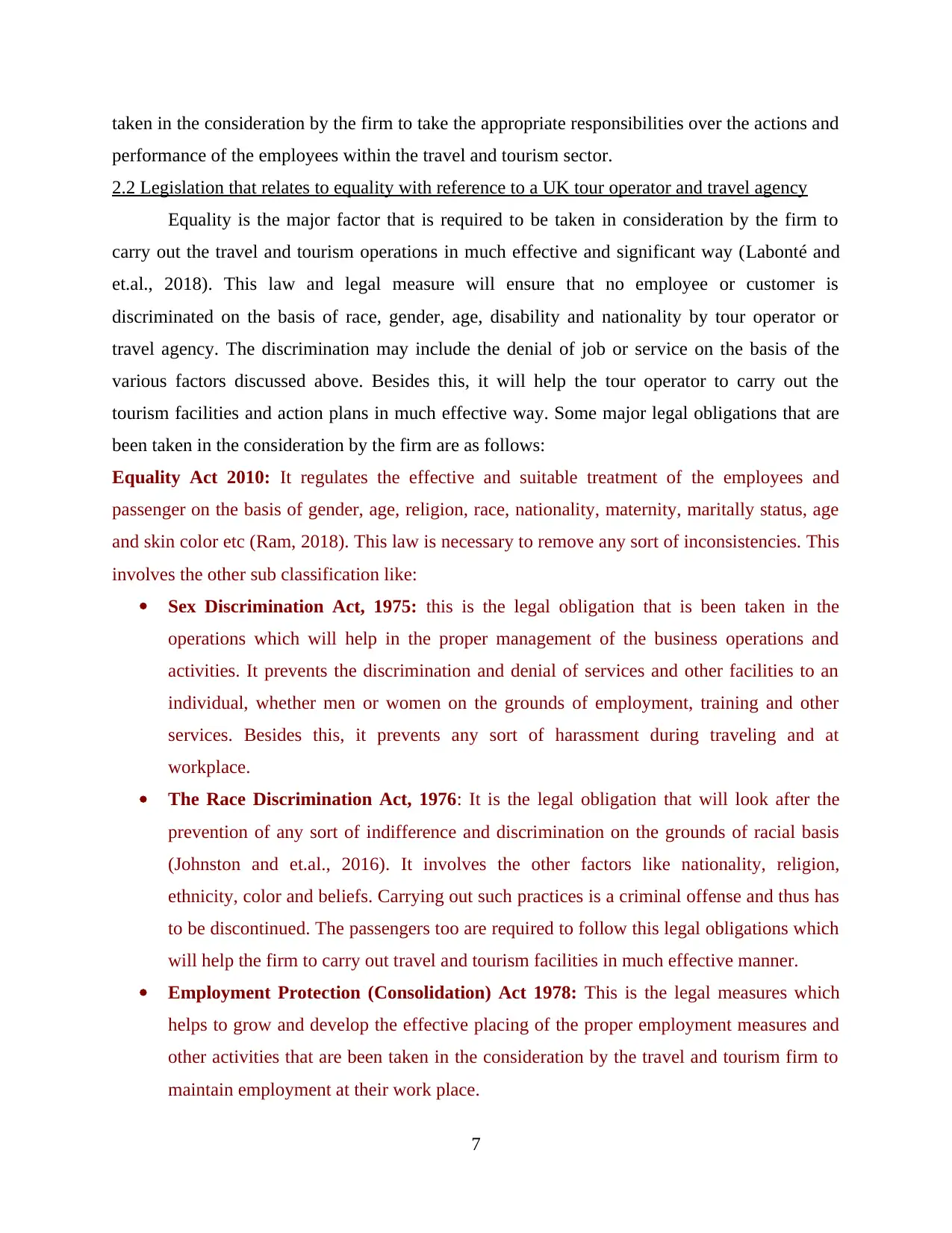
taken in the consideration by the firm to take the appropriate responsibilities over the actions and
performance of the employees within the travel and tourism sector.
2.2 Legislation that relates to equality with reference to a UK tour operator and travel agency
Equality is the major factor that is required to be taken in consideration by the firm to
carry out the travel and tourism operations in much effective and significant way (Labonté and
et.al., 2018). This law and legal measure will ensure that no employee or customer is
discriminated on the basis of race, gender, age, disability and nationality by tour operator or
travel agency. The discrimination may include the denial of job or service on the basis of the
various factors discussed above. Besides this, it will help the tour operator to carry out the
tourism facilities and action plans in much effective way. Some major legal obligations that are
been taken in the consideration by the firm are as follows:
Equality Act 2010: It regulates the effective and suitable treatment of the employees and
passenger on the basis of gender, age, religion, race, nationality, maternity, maritally status, age
and skin color etc (Ram, 2018). This law is necessary to remove any sort of inconsistencies. This
involves the other sub classification like:
Sex Discrimination Act, 1975: this is the legal obligation that is been taken in the
operations which will help in the proper management of the business operations and
activities. It prevents the discrimination and denial of services and other facilities to an
individual, whether men or women on the grounds of employment, training and other
services. Besides this, it prevents any sort of harassment during traveling and at
workplace.
The Race Discrimination Act, 1976: It is the legal obligation that will look after the
prevention of any sort of indifference and discrimination on the grounds of racial basis
(Johnston and et.al., 2016). It involves the other factors like nationality, religion,
ethnicity, color and beliefs. Carrying out such practices is a criminal offense and thus has
to be discontinued. The passengers too are required to follow this legal obligations which
will help the firm to carry out travel and tourism facilities in much effective manner.
Employment Protection (Consolidation) Act 1978: This is the legal measures which
helps to grow and develop the effective placing of the proper employment measures and
other activities that are been taken in the consideration by the travel and tourism firm to
maintain employment at their work place.
7
performance of the employees within the travel and tourism sector.
2.2 Legislation that relates to equality with reference to a UK tour operator and travel agency
Equality is the major factor that is required to be taken in consideration by the firm to
carry out the travel and tourism operations in much effective and significant way (Labonté and
et.al., 2018). This law and legal measure will ensure that no employee or customer is
discriminated on the basis of race, gender, age, disability and nationality by tour operator or
travel agency. The discrimination may include the denial of job or service on the basis of the
various factors discussed above. Besides this, it will help the tour operator to carry out the
tourism facilities and action plans in much effective way. Some major legal obligations that are
been taken in the consideration by the firm are as follows:
Equality Act 2010: It regulates the effective and suitable treatment of the employees and
passenger on the basis of gender, age, religion, race, nationality, maternity, maritally status, age
and skin color etc (Ram, 2018). This law is necessary to remove any sort of inconsistencies. This
involves the other sub classification like:
Sex Discrimination Act, 1975: this is the legal obligation that is been taken in the
operations which will help in the proper management of the business operations and
activities. It prevents the discrimination and denial of services and other facilities to an
individual, whether men or women on the grounds of employment, training and other
services. Besides this, it prevents any sort of harassment during traveling and at
workplace.
The Race Discrimination Act, 1976: It is the legal obligation that will look after the
prevention of any sort of indifference and discrimination on the grounds of racial basis
(Johnston and et.al., 2016). It involves the other factors like nationality, religion,
ethnicity, color and beliefs. Carrying out such practices is a criminal offense and thus has
to be discontinued. The passengers too are required to follow this legal obligations which
will help the firm to carry out travel and tourism facilities in much effective manner.
Employment Protection (Consolidation) Act 1978: This is the legal measures which
helps to grow and develop the effective placing of the proper employment measures and
other activities that are been taken in the consideration by the travel and tourism firm to
maintain employment at their work place.
7
⊘ This is a preview!⊘
Do you want full access?
Subscribe today to unlock all pages.

Trusted by 1+ million students worldwide
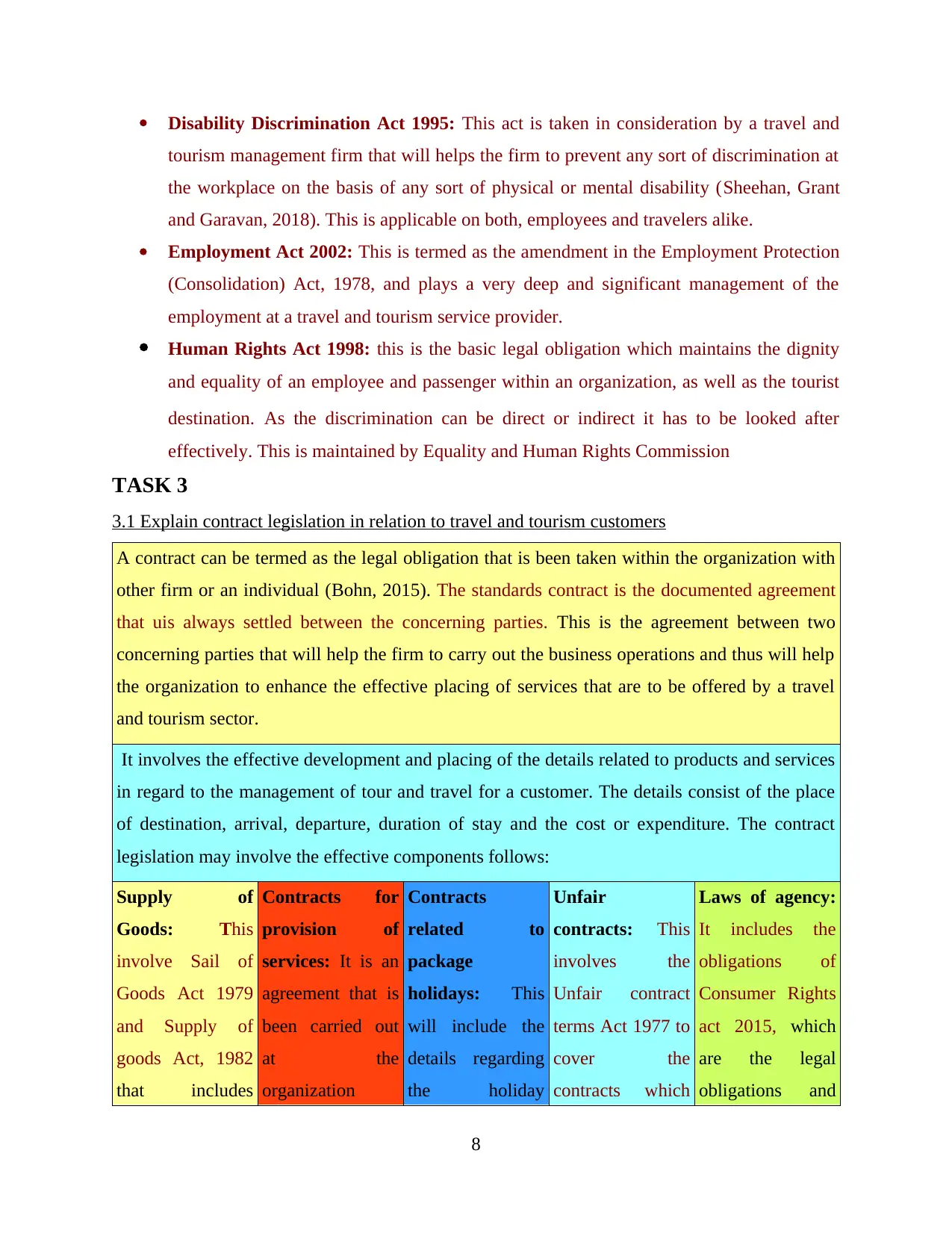
Disability Discrimination Act 1995: This act is taken in consideration by a travel and
tourism management firm that will helps the firm to prevent any sort of discrimination at
the workplace on the basis of any sort of physical or mental disability (Sheehan, Grant
and Garavan, 2018). This is applicable on both, employees and travelers alike.
Employment Act 2002: This is termed as the amendment in the Employment Protection
(Consolidation) Act, 1978, and plays a very deep and significant management of the
employment at a travel and tourism service provider.
Human Rights Act 1998: this is the basic legal obligation which maintains the dignity
and equality of an employee and passenger within an organization, as well as the tourist
destination. As the discrimination can be direct or indirect it has to be looked after
effectively. This is maintained by Equality and Human Rights Commission
TASK 3
3.1 Explain contract legislation in relation to travel and tourism customers
A contract can be termed as the legal obligation that is been taken within the organization with
other firm or an individual (Bohn, 2015). The standards contract is the documented agreement
that uis always settled between the concerning parties. This is the agreement between two
concerning parties that will help the firm to carry out the business operations and thus will help
the organization to enhance the effective placing of services that are to be offered by a travel
and tourism sector.
It involves the effective development and placing of the details related to products and services
in regard to the management of tour and travel for a customer. The details consist of the place
of destination, arrival, departure, duration of stay and the cost or expenditure. The contract
legislation may involve the effective components follows:
Supply of
Goods: This
involve Sail of
Goods Act 1979
and Supply of
goods Act, 1982
that includes
Contracts for
provision of
services: It is an
agreement that is
been carried out
at the
organization
Contracts
related to
package
holidays: This
will include the
details regarding
the holiday
Unfair
contracts: This
involves the
Unfair contract
terms Act 1977 to
cover the
contracts which
Laws of agency:
It includes the
obligations of
Consumer Rights
act 2015, which
are the legal
obligations and
8
tourism management firm that will helps the firm to prevent any sort of discrimination at
the workplace on the basis of any sort of physical or mental disability (Sheehan, Grant
and Garavan, 2018). This is applicable on both, employees and travelers alike.
Employment Act 2002: This is termed as the amendment in the Employment Protection
(Consolidation) Act, 1978, and plays a very deep and significant management of the
employment at a travel and tourism service provider.
Human Rights Act 1998: this is the basic legal obligation which maintains the dignity
and equality of an employee and passenger within an organization, as well as the tourist
destination. As the discrimination can be direct or indirect it has to be looked after
effectively. This is maintained by Equality and Human Rights Commission
TASK 3
3.1 Explain contract legislation in relation to travel and tourism customers
A contract can be termed as the legal obligation that is been taken within the organization with
other firm or an individual (Bohn, 2015). The standards contract is the documented agreement
that uis always settled between the concerning parties. This is the agreement between two
concerning parties that will help the firm to carry out the business operations and thus will help
the organization to enhance the effective placing of services that are to be offered by a travel
and tourism sector.
It involves the effective development and placing of the details related to products and services
in regard to the management of tour and travel for a customer. The details consist of the place
of destination, arrival, departure, duration of stay and the cost or expenditure. The contract
legislation may involve the effective components follows:
Supply of
Goods: This
involve Sail of
Goods Act 1979
and Supply of
goods Act, 1982
that includes
Contracts for
provision of
services: It is an
agreement that is
been carried out
at the
organization
Contracts
related to
package
holidays: This
will include the
details regarding
the holiday
Unfair
contracts: This
involves the
Unfair contract
terms Act 1977 to
cover the
contracts which
Laws of agency:
It includes the
obligations of
Consumer Rights
act 2015, which
are the legal
obligations and
8
Paraphrase This Document
Need a fresh take? Get an instant paraphrase of this document with our AI Paraphraser
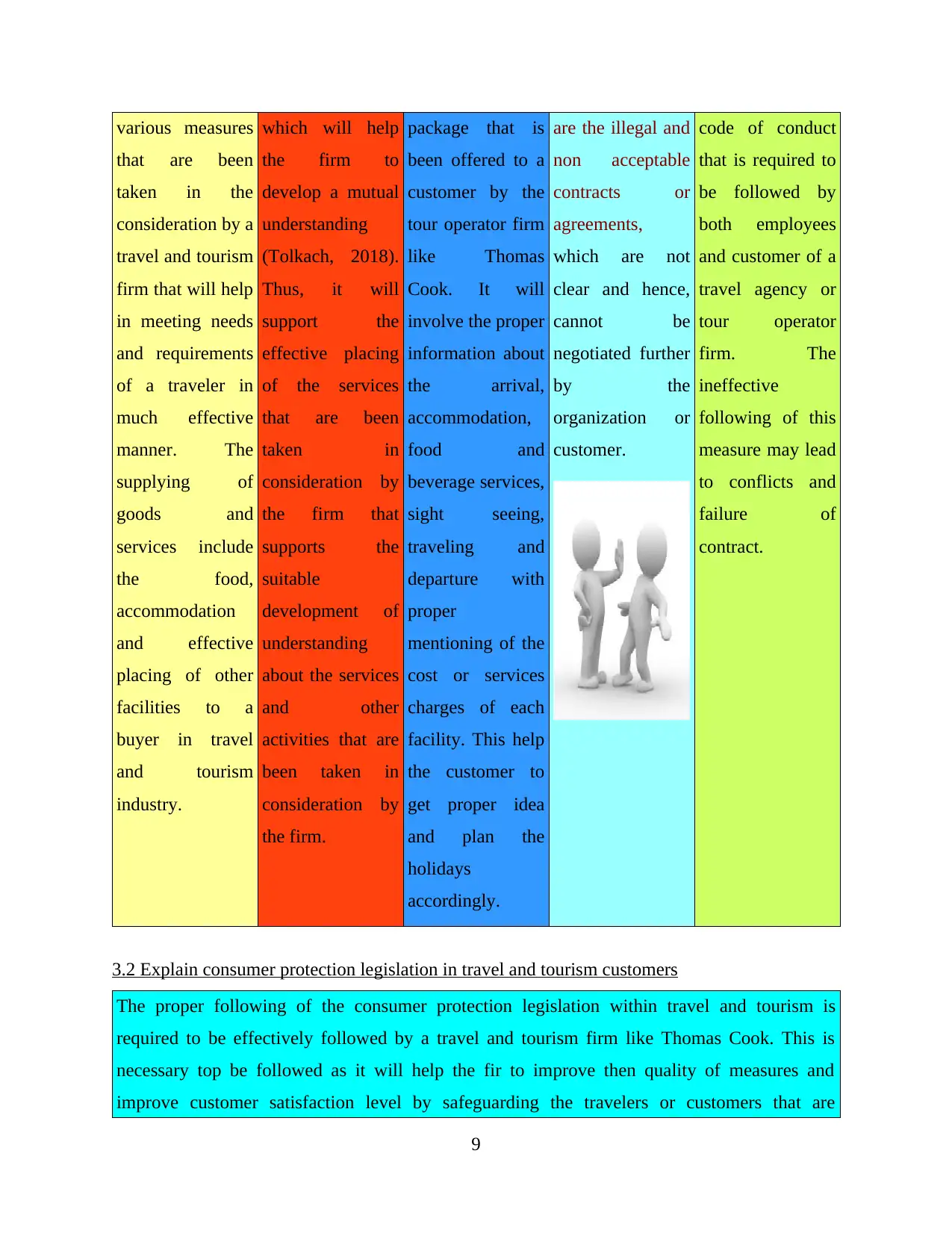
various measures
that are been
taken in the
consideration by a
travel and tourism
firm that will help
in meeting needs
and requirements
of a traveler in
much effective
manner. The
supplying of
goods and
services include
the food,
accommodation
and effective
placing of other
facilities to a
buyer in travel
and tourism
industry.
which will help
the firm to
develop a mutual
understanding
(Tolkach, 2018).
Thus, it will
support the
effective placing
of the services
that are been
taken in
consideration by
the firm that
supports the
suitable
development of
understanding
about the services
and other
activities that are
been taken in
consideration by
the firm.
package that is
been offered to a
customer by the
tour operator firm
like Thomas
Cook. It will
involve the proper
information about
the arrival,
accommodation,
food and
beverage services,
sight seeing,
traveling and
departure with
proper
mentioning of the
cost or services
charges of each
facility. This help
the customer to
get proper idea
and plan the
holidays
accordingly.
are the illegal and
non acceptable
contracts or
agreements,
which are not
clear and hence,
cannot be
negotiated further
by the
organization or
customer.
code of conduct
that is required to
be followed by
both employees
and customer of a
travel agency or
tour operator
firm. The
ineffective
following of this
measure may lead
to conflicts and
failure of
contract.
3.2 Explain consumer protection legislation in travel and tourism customers
The proper following of the consumer protection legislation within travel and tourism is
required to be effectively followed by a travel and tourism firm like Thomas Cook. This is
necessary top be followed as it will help the fir to improve then quality of measures and
improve customer satisfaction level by safeguarding the travelers or customers that are
9
that are been
taken in the
consideration by a
travel and tourism
firm that will help
in meeting needs
and requirements
of a traveler in
much effective
manner. The
supplying of
goods and
services include
the food,
accommodation
and effective
placing of other
facilities to a
buyer in travel
and tourism
industry.
which will help
the firm to
develop a mutual
understanding
(Tolkach, 2018).
Thus, it will
support the
effective placing
of the services
that are been
taken in
consideration by
the firm that
supports the
suitable
development of
understanding
about the services
and other
activities that are
been taken in
consideration by
the firm.
package that is
been offered to a
customer by the
tour operator firm
like Thomas
Cook. It will
involve the proper
information about
the arrival,
accommodation,
food and
beverage services,
sight seeing,
traveling and
departure with
proper
mentioning of the
cost or services
charges of each
facility. This help
the customer to
get proper idea
and plan the
holidays
accordingly.
are the illegal and
non acceptable
contracts or
agreements,
which are not
clear and hence,
cannot be
negotiated further
by the
organization or
customer.
code of conduct
that is required to
be followed by
both employees
and customer of a
travel agency or
tour operator
firm. The
ineffective
following of this
measure may lead
to conflicts and
failure of
contract.
3.2 Explain consumer protection legislation in travel and tourism customers
The proper following of the consumer protection legislation within travel and tourism is
required to be effectively followed by a travel and tourism firm like Thomas Cook. This is
necessary top be followed as it will help the fir to improve then quality of measures and
improve customer satisfaction level by safeguarding the travelers or customers that are
9
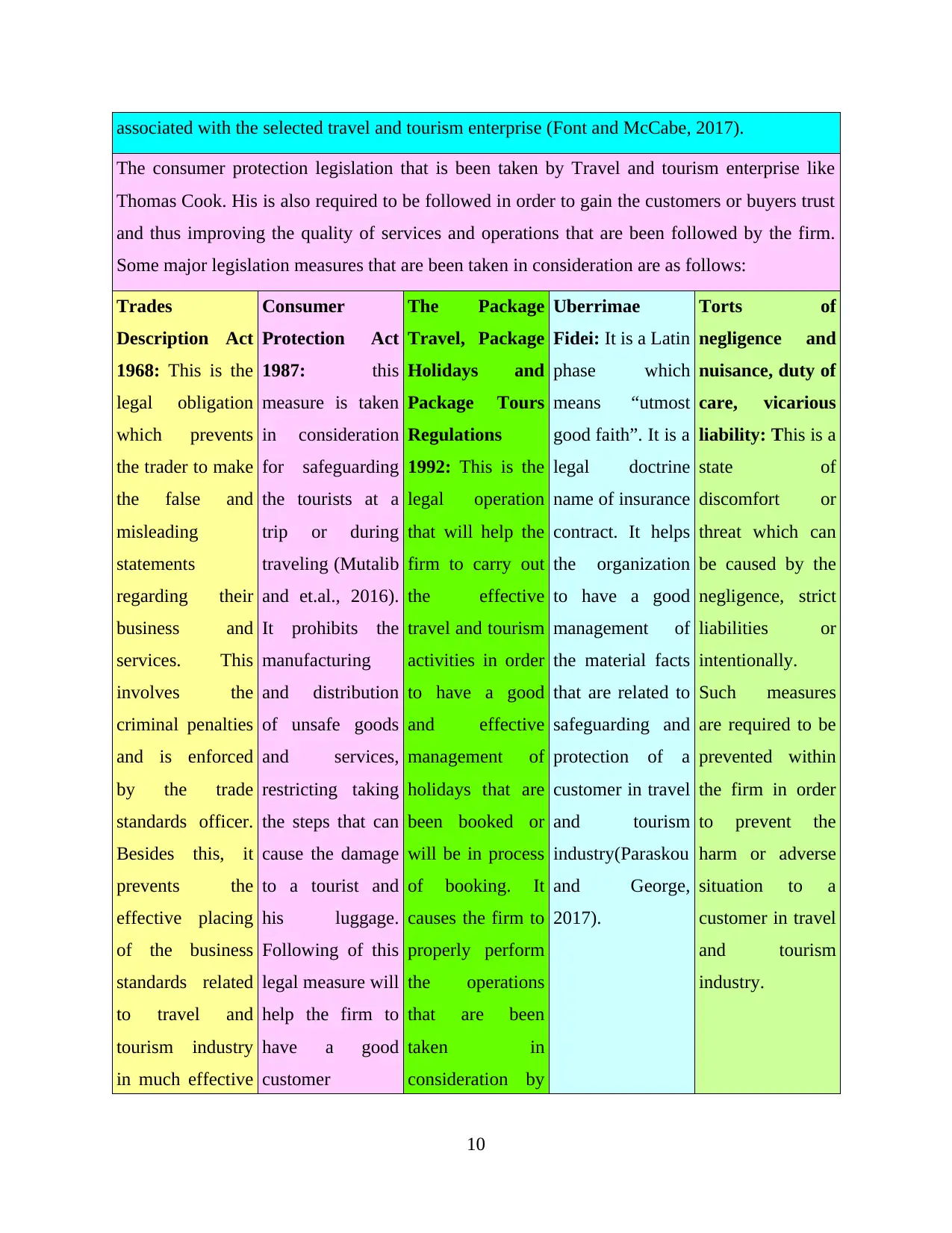
associated with the selected travel and tourism enterprise (Font and McCabe, 2017).
The consumer protection legislation that is been taken by Travel and tourism enterprise like
Thomas Cook. His is also required to be followed in order to gain the customers or buyers trust
and thus improving the quality of services and operations that are been followed by the firm.
Some major legislation measures that are been taken in consideration are as follows:
Trades
Description Act
1968: This is the
legal obligation
which prevents
the trader to make
the false and
misleading
statements
regarding their
business and
services. This
involves the
criminal penalties
and is enforced
by the trade
standards officer.
Besides this, it
prevents the
effective placing
of the business
standards related
to travel and
tourism industry
in much effective
Consumer
Protection Act
1987: this
measure is taken
in consideration
for safeguarding
the tourists at a
trip or during
traveling (Mutalib
and et.al., 2016).
It prohibits the
manufacturing
and distribution
of unsafe goods
and services,
restricting taking
the steps that can
cause the damage
to a tourist and
his luggage.
Following of this
legal measure will
help the firm to
have a good
customer
The Package
Travel, Package
Holidays and
Package Tours
Regulations
1992: This is the
legal operation
that will help the
firm to carry out
the effective
travel and tourism
activities in order
to have a good
and effective
management of
holidays that are
been booked or
will be in process
of booking. It
causes the firm to
properly perform
the operations
that are been
taken in
consideration by
Uberrimae
Fidei: It is a Latin
phase which
means “utmost
good faith”. It is a
legal doctrine
name of insurance
contract. It helps
the organization
to have a good
management of
the material facts
that are related to
safeguarding and
protection of a
customer in travel
and tourism
industry(Paraskou
and George,
2017).
Torts of
negligence and
nuisance, duty of
care, vicarious
liability: This is a
state of
discomfort or
threat which can
be caused by the
negligence, strict
liabilities or
intentionally.
Such measures
are required to be
prevented within
the firm in order
to prevent the
harm or adverse
situation to a
customer in travel
and tourism
industry.
10
The consumer protection legislation that is been taken by Travel and tourism enterprise like
Thomas Cook. His is also required to be followed in order to gain the customers or buyers trust
and thus improving the quality of services and operations that are been followed by the firm.
Some major legislation measures that are been taken in consideration are as follows:
Trades
Description Act
1968: This is the
legal obligation
which prevents
the trader to make
the false and
misleading
statements
regarding their
business and
services. This
involves the
criminal penalties
and is enforced
by the trade
standards officer.
Besides this, it
prevents the
effective placing
of the business
standards related
to travel and
tourism industry
in much effective
Consumer
Protection Act
1987: this
measure is taken
in consideration
for safeguarding
the tourists at a
trip or during
traveling (Mutalib
and et.al., 2016).
It prohibits the
manufacturing
and distribution
of unsafe goods
and services,
restricting taking
the steps that can
cause the damage
to a tourist and
his luggage.
Following of this
legal measure will
help the firm to
have a good
customer
The Package
Travel, Package
Holidays and
Package Tours
Regulations
1992: This is the
legal operation
that will help the
firm to carry out
the effective
travel and tourism
activities in order
to have a good
and effective
management of
holidays that are
been booked or
will be in process
of booking. It
causes the firm to
properly perform
the operations
that are been
taken in
consideration by
Uberrimae
Fidei: It is a Latin
phase which
means “utmost
good faith”. It is a
legal doctrine
name of insurance
contract. It helps
the organization
to have a good
management of
the material facts
that are related to
safeguarding and
protection of a
customer in travel
and tourism
industry(Paraskou
and George,
2017).
Torts of
negligence and
nuisance, duty of
care, vicarious
liability: This is a
state of
discomfort or
threat which can
be caused by the
negligence, strict
liabilities or
intentionally.
Such measures
are required to be
prevented within
the firm in order
to prevent the
harm or adverse
situation to a
customer in travel
and tourism
industry.
10
⊘ This is a preview!⊘
Do you want full access?
Subscribe today to unlock all pages.

Trusted by 1+ million students worldwide
1 out of 17
Related Documents
Your All-in-One AI-Powered Toolkit for Academic Success.
+13062052269
info@desklib.com
Available 24*7 on WhatsApp / Email
![[object Object]](/_next/static/media/star-bottom.7253800d.svg)
Unlock your academic potential
Copyright © 2020–2026 A2Z Services. All Rights Reserved. Developed and managed by ZUCOL.
